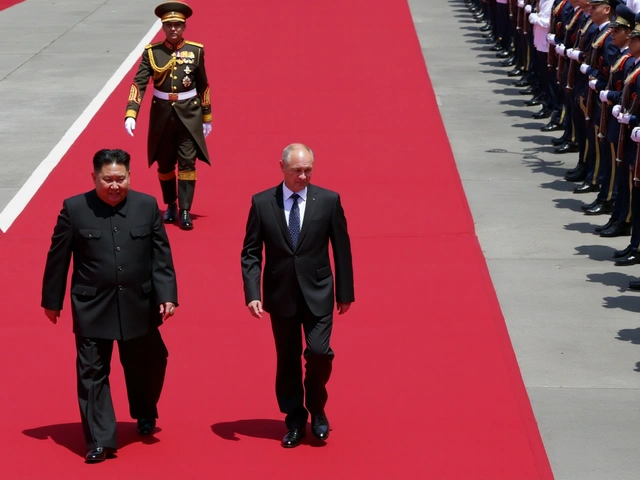Peter Mbae Resigns: A Decision Rooted in Challenges
In a surprising turn of events, Peter Mbae, the head of Kenya's Government Delivery Service (GDS), has decided to step down from his position. Mbae, who was appointed just a few months ago in June 2023, cited several unaddressed concerns and ongoing frustrations as primary reasons for his resignation. His announcement sent ripples through the political and administrative landscape of Kenya, as he had been a key player in implementing government directives and ensuring the effective functioning of various Ministries, Departments, and Agencies (MDAs) under the Kenya Kwanza administration.
Mbae's departure came as a blow to the administration, given his prior role as the Secretary for Investments Promotion within the Ministry of Investments, Trade, and Industry. Known for his dedication and professional prowess, Mbae had taken on the task of overseeing government programs with a vision to eliminate redundancies, create synergies, and maximize the socio-economic impact of national priorities. His role was pivotal in tracking progress and aligning efforts across different governmental bodies, making his resignation all the more poignant.
Work Frustrations and Unresolved Challenges
Mbae's frustrations were not baseless. During his tenure, he battled several challenges within the bureaucratic framework that continually obstructed the realization of his goals. Despite his best efforts, these elements persisted, creating an environment that was less than conducive for fulfilling his mandate. His commitment to transparency and accountability came through in the letter he penned to Felix Koskei, the Head of Public Service. In this letter, he highlighted the unresolved issues that led him to the difficult decision of stepping down.
Although Mbae was enthusiastic about his responsibilities and consistently focused on delivering substantial results, the systemic inefficiencies and lack of resolution to critical problems left him with limited options. His dissatisfaction was compounded by what he described as an untenable work environment, highlighting the broader issues inherent in the current administrative setup. His journey reflects a narrative that is all too familiar in public service, where passion and drive often meet with the harsh realities of systemic inertia.
The Impact of Mbae's Tenure and His Future Plans
Mbae's impact during his short stint at the GDS was marked by his relentless drive to harness synergies across different sectors. Aiming to break down silos and encourage a unified approach to governance, his efforts were geared towards ensuring that governmental initiatives were implemented efficiently and effectively. However, despite his passion, the lack of support and progress on addressing his concerns led to his decision to move on.
In his resignation letter, Mbae emphasized the importance of remaining accountable to the people of Kenya. He deemed it necessary to publicly disengage from his position in order to pave the way for new opportunities. His decision to refocus on his prior professional pursuits was met with both support and disappointment by peers and collaborators alike, who recognized his contributions and the potential loss his resignation signified.
The transition for Mbae involves returning to his career outside the government sphere, where his expertise in investment promotion and trade had already carved a niche for him. His professional journey prior to his appointment as the head of GDS equipped him with a deep understanding of economic development, positioning him to continue making meaningful contributions, albeit in a different capacity.

Broader Implications and Conclusions
Mbae's resignation serves as a reminder of the persistent challenges within governmental systems, particularly in environments where change is resisted. His departure highlights the need for open dialogue, responsive action, and effective problem-solving mechanisms within public administration. It also raises critical questions about the retention of talented individuals who are fully committed to national development but find themselves hampered by existing structures.
The story of Peter Mbae's resignation is not only about an individual's choice to leave a bureaucratic challenge behind. It impacts broader perspectives on governance, accountability, and the importance of creating work environments that empower rather than restrain leaders. As Kenya moves forward, Mbae's experiences and insights remain invaluable, offering lessons that extend beyond governmental corridors, touching upon the very core of effective public service delivery.







JAYESH DHUMAK
January 14, 2025 AT 00:22Peter Mbae’s resignation highlights a structural inertia that is endemic to many public administrations. The chronic mismatch between policy intent and operational capacity creates a feedback loop that erodes both morale and effectiveness. In his brief tenure, Mbae attempted to introduce a cross‑ministry dashboard that could have served as a real‑time performance monitor; such a tool, if fully supported, might have reduced duplication and clarified accountability. However, entrenched procedural bottlenecks and the absence of a decisive change‑management framework obstructed even modest pilot implementations. The letter addressed to Felix Koskei enumerated specific procedural delays, such as the protracted procurement approvals that routinely exceeded statutory limits. Moreover, the lack of a transparent grievance‑redress mechanism left frontline officers without recourse, compounding frustration at every level. It is also worth noting that the political imperative to showcase quick wins often clashes with the bureaucratic culture of incrementalism, leading to a paradox where visible progress is deliberately throttled. In the broader context of Kenya’s development agenda, losing a technocrat of Mbae’s caliber may signal a deeper talent‑retention problem that could hamper long‑term reforms. Future administrations would benefit from institutionalising mentorship pathways that protect reform‑oriented officials from burnout. A systematic audit of the GDS’s operational protocols could identify low‑hanging fruit for rapid improvement. Equally important is the cultivation of a culture that rewards evidence‑based decision‑making rather than procedural conformity. Finally, the public sector must reckon with the need for continuous professional development to keep pace with evolving governance challenges. Only then can the cycle of resignation and disillusionment be broken, allowing dedicated leaders to thrive rather than retreat.
Santosh Sharma
January 23, 2025 AT 06:36It’s inspiring to see someone like Mbae place principle over comfort; his decision sends a powerful message that integrity cannot be compromised. Leaders must view such moves as a catalyst to rethink how support structures are designed. By fostering open dialogue and swift problem‑resolution mechanisms, ministries can rebuild confidence among their staff. The momentum generated by this episode should be harnessed to implement concrete reforms, ensuring that future heads of the GDS are equipped with the resources they need to succeed.
yatharth chandrakar
February 1, 2025 AT 12:49Mbae’s experience underscores the necessity of aligning strategic objectives with operational realities. When policy directives are issued without clear implementation pathways, even the most competent officials encounter resistance. A practical step would be to develop a standardized project‑execution template that integrates risk assessment, stakeholder mapping, and milestone tracking. Such a framework could preempt many of the frustrations he documented, allowing subsequent leaders to navigate bureaucratic hurdles more effectively.
Vrushali Prabhu
February 10, 2025 AT 19:02oh man, this is like watchin a train derailing ’cause the tracks ain’t kept-so many broken rules n’ lazy folks. Mbae tried real hard, but the system was like a swamp, you wade thru but jus get stuck. gotta fix tha mess, pronto!
parlan caem
February 20, 2025 AT 01:16This resignation is a textbook example of why bureaucratic complacency is deadly. The leadership’s inability to address blatant inefficiencies reeks of negligence, and Mbae’s exit is merely the latest symptom of a rotting core. If the administration continues to ignore such glaring flaws, more competent professionals will abandon ship, leaving a vacuum filled only by the same stagnant mindset.
Mayur Karanjkar
March 1, 2025 AT 07:29Systemic inertia functions as a negative feedback loop within governance ecosystems, perpetuating suboptimal equilibria. Disrupting this pattern necessitates a paradigm shift toward adaptive governance models that prioritize iterative learning over static hierarchies.
Sara Khan M
March 10, 2025 AT 13:42What a loss 😔
shubham ingale
March 19, 2025 AT 19:56We can turn this around 🚀
Ajay Ram
March 29, 2025 AT 02:09Reading the analysis of Mbae’s tenure prompts reflection on the broader cultural dimensions that shape public institutions. While procedural reforms are essential, they must be embedded within a narrative that acknowledges the human element of bureaucracy. Staff members often operate under implicit expectations that are transmitted through informal networks, and these cultural undercurrents can either reinforce or undermine formal policy changes. By fostering inclusive mentorship programs, senior officials can model adaptability and resilience, thereby gradually reshaping organizational norms. Additionally, integrating cross‑cultural perspectives can illuminate blind spots that domestic policymakers might overlook, especially in a diverse nation such as Kenya. The synthesis of top‑down directives with bottom‑up feedback creates a more holistic governance model, one that is responsive to both macro‑level goals and micro‑level challenges. It is also crucial to invest in continuous professional development that equips employees with the analytical tools needed to navigate complex regulatory landscapes. When such investments are paired with transparent performance metrics, the system becomes self‑correcting, reducing the likelihood of future resignations rooted in frustration. Ultimately, the objective should be to build a resilient institutional fabric that supports visionary leaders rather than forces them to exit in disillusionment.